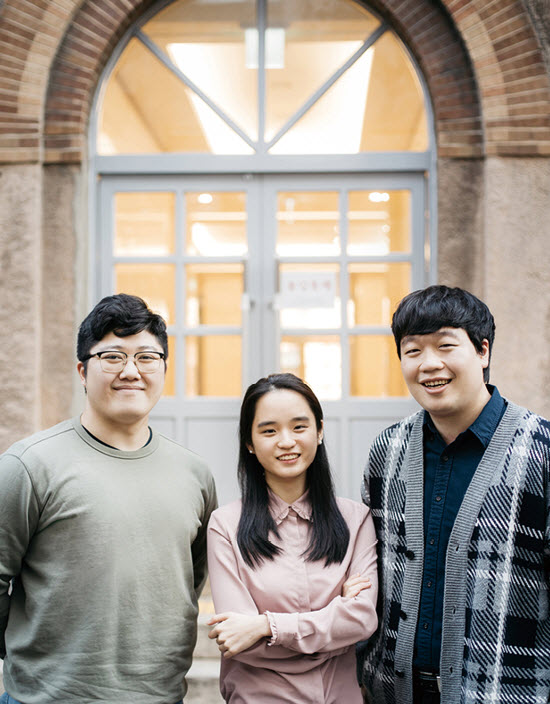
Medical Volunteering student association CaSA (Yeon-sung Choi, Yoon-jae Lee, Ji-ho Jeong Dept. of Medicine, SNU)
Empathizing the value of service together
Founded in 1958, Casa is a Catholic student association and a storied medical volunteer club at Seoul National University’s College of Medicine. Since 1997, when the Raphael Clinic was founded, Casa has opened a clinic every Sunday to improve the weak treatment environment for migrant workers. In addition, Casa runs a clinic in a rural area with poor access to medical care every summer, and in winter, provides medical services in Manila in the Philippines, ensuring the vulnerable have access to medical care. “Before I enrolled in medical school, I saw seniors coming out to volunteer on the weekend even though they were busy with their studies but still volunteered at the Raphael Clinic, and it was really cool. I joined because I thought that if I volunteered at Casa, I would be able to grow as a medical professional with a warm heart.” (Yoon-jae Lee)
I wonder how your thoughts about volunteering while working at Casa would have changed. “I've been serving only intermittently, but as I volunteered regularly at Casa, I learned that my minor efforts had a major impact on patients. It became the driving force for me continuing my service.” (Yeon-sung Choi)
At Casa, they said that you can discern value that other clubs don’t offer. Most of the clubs are groups of people with the same hobbies, but Casa provides a place for Catholics and non-believers to experience with the value of “service” and cooperate together. “In Casa, there are people of all ages, genders, and people who have lived different lives but have come together in medical school. I feel the great value of volunteering, as it is an opportunity for such diverse and passionate people to participate and cooperate.” (Ji-ho Jeong)
As a medical practitioner who meets the needs of marginalized neighbors
COVID-19, which stopped all daily life, also affected Casa's service. Prior to the pandemic, if the members of the Casa felt the burden of finding time for weekly medical treatment, which had to go along with their busy studies, now they often feel anguished because they can’t serve. “When I think of the 300-500 patients every week who came to the Raphael Clinic, rural patients I treated in the summer, and my Filipino friends, I am worried about how they are receiving medical treatment in other places.” Because of the need to find work as a soon-to-be medical professional, Casa also helped with non-face-to-face digital treatment at Raphael Clinic, which was limited to chronically ill patients until the quarantine regulations were reinforced and treatment stopped. In addition, Casa is participating in seminars and academic video productions to raise the spirit of sharing with professors from the medical school who want to use this period as a learning opportunity as we move forward in two-step increments.
What kind of medical professionals do they want to be? “I want to be a competent medical person. A lot of medical knowledge is important, but what I experienced at Casa is that first you need to know how the patient feels. I think it is competent to see the patient's heart and situation as an integrated whole when treating them.” (Yun-jae Lee)
As I experienced cooperation to make the world a better place through the volunteer efforts of various members, I asked if there was anything they would like to convey about cooperation. “With COVID-19, I think that the opportunities for cooperation have become scarce and more valuable than before. When valuable experiences of cooperation emerge us in the future, I hope that members of the Seoul National University family will positively embrace and cooperate with each other.” (Ji-ho Jeong)

